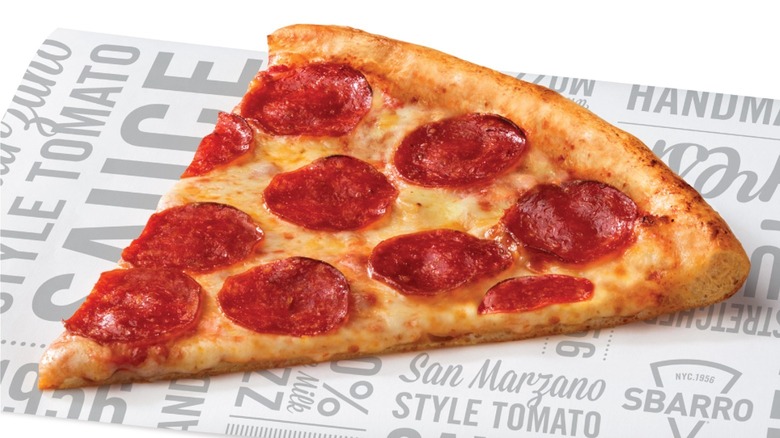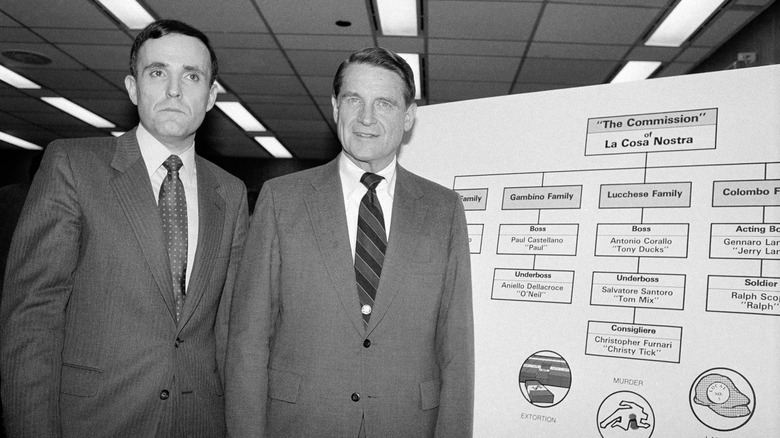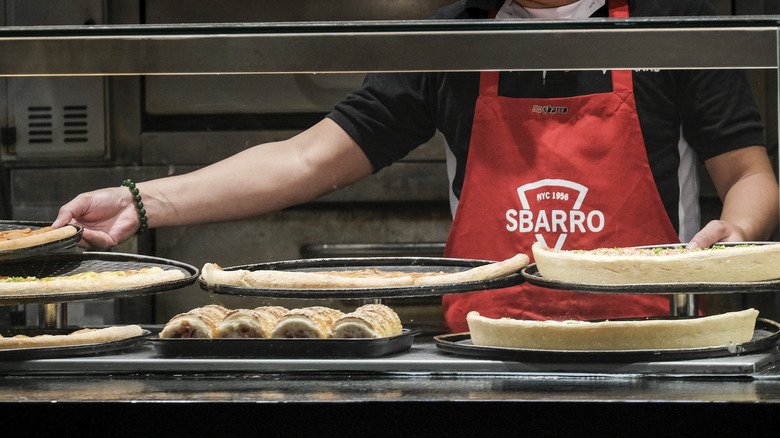The Sbarro Scandal That Allegedly Connected It To A 1970s Mob Boss
The Sbarro pizza chain is a familiar sight in malls across America and internationally, with franchise locations everywhere from Riyadh to Saudi Arabia to Mumbai, India. While the chain doesn't feel much like a "New York-style" pizza operation these days, its origins are steeped in Italian-American history — and rumors — for better and for worse. Neapolitan immigrants Gennaro and Carmela Sbarro first opened their mom-and-pop delicatessen and eatery in Brooklyn's Bensonhurst neighborhood in the 1950s, an area populated by many Italian-Americans. Their business thrived, and In 1970, the family decided to streamline their model and open a Sbarro inside a new mall food court in Kings Plaza, Brooklyn, paving the way for what would become a national pizzeria franchise. Somewhere along the way, they seemingly also attracted the attention of some wise guys.
Unsurprisingly, the alleged connection between the pizzeria and the Mafia doesn't appear on the company's website, and even the allegations are contested. Even so, some believe the chain was long owned by the infamous Frank "Funzi" Tieri. Tieri — famously presentable and even charming — was long reputed to be the boss of the Genovese family, one of the five families thought to be the backbone of the New York-based Mafia, known as "La Cosa Nostra." To hide their ill-gotten gains, mobsters often poured their money into legitimate businesses. Law enforcement officials suspected that Sbarro was one of the beneficiaries of Tieri's money-laundering activity.
Was Sbarro actually owned by an infamous mafioso?
These suspicions surfaced publicly in July 1980, when Tieri was indicted on eight counts, including racketeering and murder charges. On January 23, 1981, Tieri was convicted on five of those eight counts. His case even made history: Though many had long believed powerful players ruled the American Mafia, this was the first official allegation that anyone was the head of a crime family. This claim compounded the prosecution's responsibilities, as they had to prove several key elements: That a specifically American branch of the Mafia existed; that the famous five families were real; and that Tieri himself was the head of the Genovese clan.
Apparently, they made a convincing case. Some of the specific allegations presented during the trial were that Tieri was the actual owner of the Sbarro pizzeria chain and that he had used pressure tactics to oust another pizzeria from a Brooklyn location that Sbarro wanted to occupy.
Other sources suggest, however, that Sbarro may not have been on the receiving end of Tieri's financial gains. Sealed FBI documents on famous Jewish gangster Julius Bernstein (to which the New York Daily News gained access) suggest that Sbarro had to pay Tieri handsomely for the favor of simply staying in business. These FBI documents link Bernstein and Tieri to shakedowns of the pizzeria.
Sbarro is not currently associated with the Mafia — if it ever was
The FBI reports suggest that, by the 1960s, the Sbarro brothers were paying Tieri and the Genovese crime family protection money, the amount of which allegedly reached $20,000 per year by 2004. Bernstein, however, was never convicted of these crimes, and while law enforcement has corroborated certain angles of Bernstein's testimony, the connection to the Sbarros and their pizza remains unclear.
What is clearly established, however, is that the company is not currently associated with the Mafia — nor with the Sbarro family itself. The Sbarros maintained ownership of the business for decades, as succeeding generations took over the pizzeria chain from their parents and grandparents. During the '80s and '90s, while malls were expanding across the country, Sbarro was running a brisk business, opening up to 100 new stores annually as their pizza empire expanded. During that time, while Sbarro transitioned from a publicly traded company to a private one, Carmela Sbarro kept the family's original Bensonhurst location open. In 2004, however, she finally retired, and Bensonhurst closed shop. The Sbarro brothers then sold the business in 2007 to MidOcean Partners, definitively closing the chapter on the company's family-run existence.
Was the Mafia a player in Sbarro's success — or its demise? Even when codes of silence are broken, it's hard to know the whole truth.


